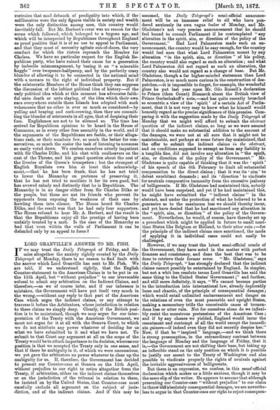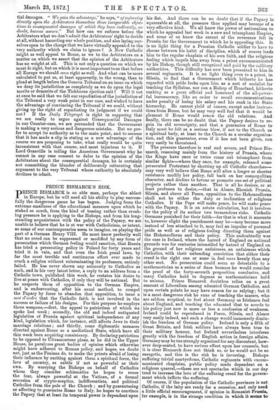LORD GRANVILLE'S ANSWER TO MR. FISH.
IF we may trust the Daily Telegraph of Friday, and die- miss altogether the anxiety rightly created by the Daily Telegraph of Monday, there is no reason to find fault with the answer which Lord Granville has sent to Mr. Fish. We are told, if we understand rightly, that the English Counter-statement to the American Claims is to be put in on the 15th April, but "without prejudice" to our irrevocable refusal to admit any arbitration on the Indirect Claims, and therefore,—as we of course infer, and if our inference is mistaken, the Government will have put itself very much in the wrong,—without any reply to that part of the American Case which urges the indirect claims, or any attempt to traverse it before the Arbitrators, whose jurisdiction in relation to these claims we simply deny. Clearly, if the British posi- tion is to be maintained, though we may argue for our inter- pretation of the Treaty with the American Government, we must not argue for it at all with the Geneva Court, to which we do not attribute any power whatever of deciding for us what we have submitted to it and what we have not. To submit to that Court any argument at all on the scope of the Treaty would be to attach importance to its decision, whereas our position is that we accepted the Treaty only in one sense, and that if there be ambiguity in it, of which we were unconscious, we yet gave the arbitrators no power whatever to clear up the ambiguity for us. If, therefore, the Government has decided to present our Counter-case at Geneva on the 15th April, without prejudice to our right to retire altogether from the Treaty, if arbitration, either on the indirect claims themselves or on the jurisdiction of the tribunal in relation to them, be insisted on by the United States, that Counter-case must carefully exclude all argument on the subject of juris- cliction, and of the indirect claims. And if this may be assumed, the Daily Telegraph's semi-official announce- ment will be an immense relief to all who have pon- dered anxiously its own vague feeler of Monday, and Mr. Gladstone's not very precise announcement that he should feel bound to consult Parliament if he contemplated "any alteration in the spirit, aim, or direction of the policy of the Government." Had Lord Palmerston made such an an- nouncement, the country would be easy enough, for the country would feel sure that what Lord Palmerston meant by any alteration "in the spirit, aim, or direction" of his policy, the country would also regard as such an alteration ; and what Lord Palmerston did not regard as such an alteration, the country also would not regard as a change of base. But Mr. Gladstone, though a far higher-minded statesman than Lord Palmerston, is so much more curious in the construction of des- patches,—it is impossible to forget, for example, the wonderful gloss he put last year upon Mr. Odo Russell's declaration to Prince (then Count) Bismarck about the British view of Prince Gortschakoff's note,—and has quite recently broached so eccentric a view of the 'spirit' of a certain Act of Parlia- ment, that it is not very easy to know what he himself would honestly regard as the precise significance of this promise. Com- paring it with the suggestion made by the Daily Telegraph of Monday that we might well afford to submit the abstract question of the indirect claims, so long as we were assured that it should make no substantial addition to the amount of the damages, we were not at all sure that it might not be maintainable, and perhaps at some future day maintained, that the offer to submit the indirect claims in the abstract, and on conditions supposed to exempt us from any liability to a tangible fine, did not involve any alteration in "the spirit, aim, or direction of the policy of the Government." Mr. Gladstone is quite capable of thinking that it was the spirit' of his speech of the 6th February to limit all substantial compensation to the direct claims ; that it was its 'aim' to defeat exorbitant demands ; and its 'direction' to vindicate for neutrals comparative immunity from the excessive jealousy of belligerents. If Mr. Gladstone had maintained this, nobody would have been surprised, and yet if he had maintained this, he might have submitted the " indirect claims" in the abstract, and under the protection of what he believed to be a guarantee as to the maximum loss we should thereby incur, and yet have denied that he had sanctioned any alteration in the "spirit, aim, or direction" of the policy of the Govern- ment. Nevertheless, he would, of course, have thereby set up a precedent which might be applied in future to small mari- time States like Belgium or Holland, to their utter ruin ;—for the principle of the indirect claims once sanctioned, the mode of applying it in individual cases could not easily be challenged.
However, if we may trust the latest semi-official oracle of the Government, they have acted in the matter with perfect firmness and consistency, and done the best that was to be done to retrieve their former error. "Mr. Gladstone," says the Daily Telegraph, "has strongly declared that the indirect claims cannot possibly be entertained by England. In simpler, but not a whit less resolute terms Lord Granville has said the same thing to the United States' Government ;" and further, and still more definitely, it says, "We cannot become parties to the introduction into international law, already deplorably loose and chaotic, of the principle of consequential damages ; which would entail unlimited embarrassment and danger on the relations of even the most peaceable and upright States, making a momentary trifle the conceivable cause of tremen- dous loss or utter ruin. Not for ourselves alone do we inflexi- bly resist the monstrous pretensions of the American Case ; and if by any chance we yielded, England would incur the resentment and contempt of all the world except the immedi- ate gainers—if indeed even they did not secretly despise her." Now, if that be "inspired" language,—and we think there is strong presumption, in the extraordinary contrast between the language of Monday and the language of Friday, that it is,—the Government are not shifting their base, but taking up an inflexible stand on the only position on which it is possible to justify our assent to the Treaty of Washington and also possible to vindicate properly the rights of neutrals against the irritable aggressiveness of belligerents.
But there is an expression, we confess, in this same,official declaration which makes us a little anxious, though it may be the mere slip of the writer. He appears to assume that although presenting our Counter-case "without prejudice" to our claim to throw out absolutely consequential damages, we are neverthe- less to argue in that Counter-case our right to reject consequen- tial damages. " We gain the advantage," he says, "of enforcing directly upon the Arbitrators themselves those insuperable objec- tions to consequential damages of which they have indirectly, no doubt, become aware." But how can we enforce before the Arbitrators what we don't admit the Arbitrators' right to decide at all, without hazarding our whole position, and also laying our- selves open to the charge that we have virtually appealed to the very authority which we claim to ignore A New Catholic might as well appeal to Rome, as we to the Arbitrators on a matter on which we assert that the opinion of the Arbitrators has no weight at all. This is not only a question on which we must be right, but on which it is most important tons that before all Europe we should seem right as well. And what can be more calculated to put us, at least apparently, in the wrong, than to plead at length before the Geneva Tribunal on an issue on which we deny its jurisdiction as completely as we do upon the legal
merits or demerits of the Tichborne ejection suit Will it not at once be said that we felt our repudiation of the jurisdiction of the Tribunal a very weak point in our case, and wished to have the advantage of convincing the Tribunal if we could, without giving up the right of repudiating its judgment if we could
not If the Daily Telegraph is right in supposing that we are really to argue against Consequential Damages in our Counter-case, we are persuaded that the Government is making a very serious and dangerous mistake. But we pre- fer to accept its authority as to the main point, and to assume that it has made a slip in stating as a new advantage of the course we are proposing to take, what really would be quite inconsistent with that course, and most injurious to it. If Lord Granville is telling the American Government why he cannot in any case consent to defer to the opinion of the Arbitrators about the consequential damages, he is certainly not committing the blunder of deliberately reiterating that argument to the very Tribunal whose authority he absolutely declines to admit.



































 Previous page
Previous page